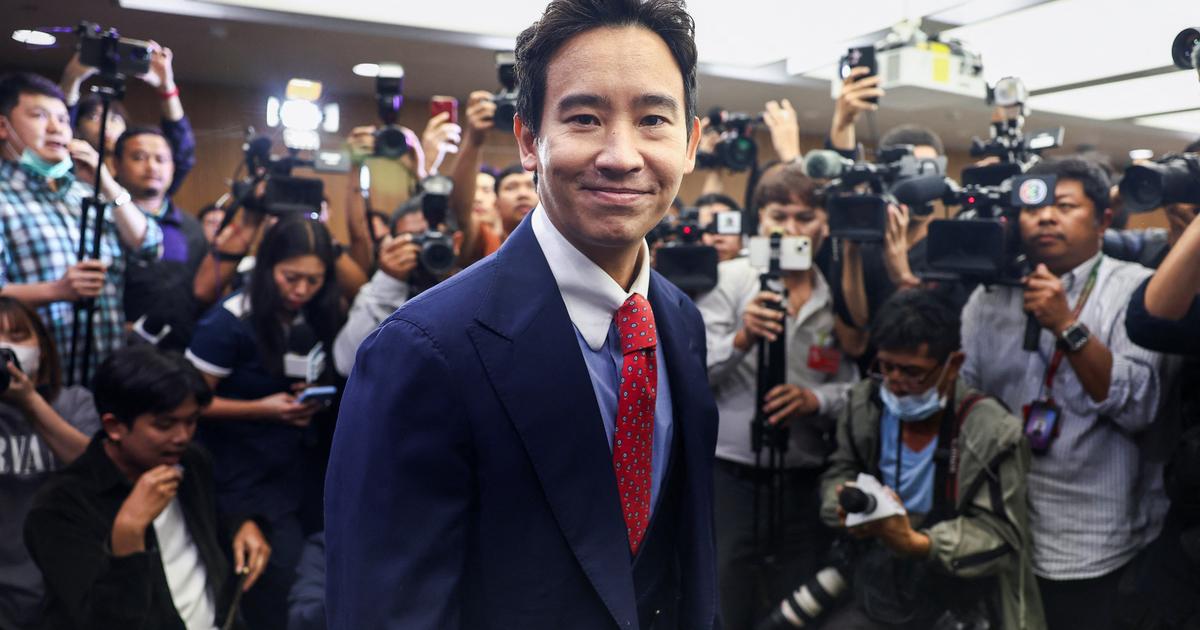One room, two atmospheres.
On Wednesday, January 31, Thailand's Constitutional Court ruled that the opposition Move Forward Party (MFP) violated the country's Constitution with its promise to amend the lèse-majesté law, just one week after rendered a favorable judgment to its leader, Pita Limjaroenrat (known as Pita).
With this decision, the political movement that emerged victorious in last year's elections must
“immediately abandon”
this proposal from its program.
The Court held that defending such reform
“is tantamount to overthrowing the democratic form of government with the king as head of state.”
»
Move Forward therefore escapes dissolution, one of the levers often used in the past by the highest legal authority in Thailand.
But the main opposition party must review its reform of the crime of lèse-majesté, although it is popular with the Thai population.
This decision comes a week after another judgment, rendered by the same Constitutional Court, in a case involving the former leader of the MFP, Pita Limjaroenrat.
Finally acquitted, the politician was able to regain his seat in the House of Representatives of Thailand.
If he has gained political survival, it is regulated, because his movement is weakened by this setback inflicted by this same authority.
“The Court often adopts a more conservative approach when it comes to a case concerning the monarchy,”
analyzes Munin Pongspan, Thai jurist and professor of law at Thammasat University in Bangkok.
A war of rights
This decision by the Constitutional Court is part of a strategy of
“law fare”,
or
“war of the law”,
in French.
The Thai regime
“neutralizes its political opponents through multiple and lengthy legal procedures,”
explains Eugénie Mérieau, specialist in Thailand and author of the book
La Dictature, une antithesis de lademocratie?
(Cavalier Bleu Eds, ed. 2024).
With the law as a political weapon,
“the traditional elites, the army and the monarchy will maintain a form of political pluralism by domesticating the opposition”,
develops the expert, who draws the parallel with the situation which prevails today in Singapore.
Section 112 of the Thai Criminal Code, commonly known as the crime of lèse-majesté, states that any person who
“defames, insults or threatens the king, queen, heir apparent or regent”
faces between 3 and 15 years in prison for each criticism.
But like other monarchies,
“this provision often serves as an alibi to prevent opposition forces from expressing themselves,”
notes Sophie Boisseau du Rocher, specialist in Southeast Asia at IFRI. .
She continues:
“We do not compromise with the monarchy.
And this is not the first time that this has happened: four parties have been dissolved since 2014”
Also read: Thailand: a draconian lèse-majesté law
In 2020, the Constitutional Court used this charge to dissolve the Future Forward Party (FFP), the political ancestor of the MFP, and to imprison its leaders.
This month, a local court sentenced a pro-democracy activist on appeal to a record 50 years in prison for the same crime of lèse-majesté, after making comments deemed insulting to the monarchy.
In total, 262 individuals were charged for this reason between July 2020, the start date of student protests against the dissolution of the FFP, and December 2023, according to figures from TLHR, a Thai human rights organization.
Hence the criticism that is mounting both in the opposition and in Thai civil society against
“the 112”
, as it is commonly nicknamed in Thailand.
Eugénie Mérieau believes that today
“the vast majority of the population is no longer at all in phase with this model of Thai-style democracy”
.
She adds:
“It is only a matter of time before other political parties take up the issue of the crime of lèse majesté.
»
“Pita Prime Minister”
Move Forward had already taken up the subject and made this reform the flagship measure of its program during the legislative election campaign last year.
Emerging victorious from this election, the party had obtained 151 seats in the Lower House of the Thai parliament but its leader, Pita, had failed to become Prime Minister because of the opposition of the senators to the boot of the army.
The task of forming the government therefore fell to the candidate of Pheu Atai, the pro-regime party which came in second place.
Since then, the excitement of the elections among the population has subsided, as has the prospect of change, while legal troubles have accumulated for Pita.
The Electoral Commission accused Pita of holding shares in the Thai television channel iTV, in contradiction with the electoral law in force in the country.
Pending the judgment, the Court suspended his seat as a deputy in July 2023 and Pita was forced to leave the leadership of his party.
The accused defended himself, explaining that his stake in ITV, inherited on the death of his father, amounted to only 0.0035% in a channel which had not broadcast since 2007. By eight to one, the nine judges of Thailand's highest court ruled in his favor, to everyone's surprise.
“This is probably the result of a careful political calculation,” observes
Munin Pogsapan.
Letting Pita survive would be more beneficial to the stability of Thai politics and the interests of the ruling class.
»
The politician has therefore regained his seat and his prominent place in Thai parliamentary life.
When he left the court on Wednesday, a crowd of supporters greeted him with cries of
“Pita Prime Minister”
.
The reformist leader still displays solid popularity with 39% favorable opinions in a poll by the Nida Institute, published last December, compared to 22% for current Prime Minister Srettha Thavisin.

